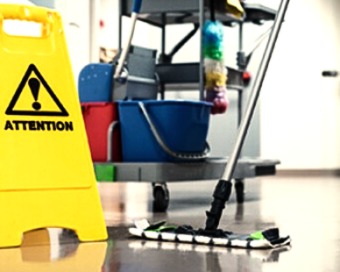Industrial cleaning is a crucial aspect of maintaining safety, productivity, and compliance in workplaces, especially in Europe, where strict regulations dictate cleanliness standards. Facility managers and operators must ensure effective cleaning strategies to maintain a safe and hygienic working environment. This guide explores the significance of industrial cleaners, their types, benefits, safety measures, and essential janitorial materials.
Importance of Industrial Cleaning in the Workplace
Industrial cleaning is necessary to remove dirt, grease, oil, and other residues that accumulate in factories, warehouses, and manufacturing facilities. Utilizing the right cleaning materials helps businesses achieve:
-
Worker Safety: Clean floors and surfaces reduce the risk of slips, falls, chemical exposure, and equipment malfunctions.
-
Regulatory Compliance: Many industries must adhere to strict hygiene and safety standards to avoid penalties and business interruptions.
-
Operational Efficiency: A clean workspace ensures optimal machine performance and reduces downtime due to equipment failure.
Types of Industrial Cleaners
Different industrial cleaners are designed for specific applications, ensuring the effective removal of contaminants without damaging surfaces.
a. Degreasers
Degreasers eliminate grease, oil, and lubricants, commonly used in manufacturing, food processing, and automotive industries.
-
Solvent-based Degreasers: Effective for heavy-duty cleaning in areas where water-based solutions may be inadequate.
-
Water-based Degreasers: More environmentally friendly and suitable for various surfaces without harsh fumes.
b. Disinfectants and Sanitizers
Critical for hygiene in food processing, healthcare, and pharmaceutical industries, these cleaners eliminate bacteria and viruses.
-
Disinfectants: Remove most bacteria and viruses, ideal for high-contact surfaces.
-
Sanitizers: Reduce germs to safe levels, ensuring adherence to health regulations.
c. Descalers
Descalers prevent limescale buildup in industrial facilities, improving the efficiency of boilers, cooling towers, and piping systems.
d. Floor Cleaners
Designed for heavy-duty cleaning in high-traffic areas, industrial floor cleaners include:
-
Acidic Floor Cleaners: Remove mineral deposits and rust.
-
Alkaline Floor Cleaners: Ideal for grease and oil removal in warehouses and garages.
e. Solvent Cleaners
Solvent-based cleaners break down organic contaminants like adhesives, oils, and resins, making them popular in the automotive, metalworking, and electronics industries.
Choosing the Right Industrial Cleaner
Selecting the best cleaner depends on the type of contaminants, surface material, and environmental concerns.
-
Material Compatibility: Ensure the cleaner does not damage or corrode surfaces.
-
Effectiveness: Choose a cleaner strong enough to remove grease, bacteria, or dust efficiently.
-
Environmental Impact: Water-based cleaners with low VOCs are preferable.
-
Safety Standards: Select products that comply with CE marking or REACH regulations.
Essential Safety Precautions for Using Industrial Cleaners
Industrial cleaners often contain strong chemicals, requiring adherence to strict safety guidelines.
a. Personal Protective Equipment (PPE)
Employees handling industrial cleaners should wear gloves, goggles, and respirators as necessary. Such items can be ordered in required quantities at best prices through MROQatar.com
b. Proper Ventilation
Certain cleaners emit fumes that can be hazardous if inhaled. Proper ventilation ensures a safe working environment.
c. Safe Storage and Handling
Store cleaning chemicals in designated areas with clear labeling to prevent accidental misuse or spills.
5. Role of Industrial Cleaning in Different Sectors
a. Automotive Industry
-
Ensures proper functioning of engines and machinery by removing grease and contaminants.
-
Enhances the longevity of equipment.
b. Aerospace Industry
-
Maintains cleanliness in aircraft fuel tanks and cabin areas.
-
Prevents corrosion and enhances safety standards.
c. Food Processing Industry
-
Prevents bacterial contamination and ensures compliance with hygiene regulations.
-
Keeps production areas free from grease, oil, and organic residues.
d. Marine Industry
-
Used for hull cleaning and deck maintenance.
-
Prevents rust and corrosion from prolonged exposure to water.
e. Electronics Industry
-
Encapsulates components for moisture protection.
-
Prevents contamination that may affect sensitive circuits.
6. Industrial Cleaning Chemicals
Common industrial cleaning chemicals include:
-
Sodium Hydroxide (Caustic Soda): Heavy-duty degreaser.
-
Hydrochloric Acid: Removes rust and scale.
-
Sulfuric Acid: Cleans metal surfaces.
-
Acetone: Degreases metal parts.
-
Isopropyl Alcohol: Cleans electronic components.
-
Ethylene Glycol: Removes heavy deposits from metal surfaces.
-
Mineral Spirits: Used for cleaning machinery.
-
Trisodium Phosphate (TSP): Cleans industrial equipment.
-
Ammonia: Removes grime and stains.
-
Chlorine Bleach: Disinfects and whitens industrial surfaces.
Industrial Cleaning Tools and Equipment
Specialized cleaning tools enhance the efficiency of industrial cleaning operations.
Leading Industrial Cleaning Tools:
-
Pressure Washers: High-pressure water jets clean large industrial surfaces.
-
Scrubbers: Used for deep floor cleaning.
-
Vacuum Cleaners: Heavy-duty vacuums for warehouses.
-
Steam Cleaners: Remove dirt using high-temperature steam.
-
Microfiber Cloths: Lint-free cloths for cleaning equipment.
-
Brooms and Dust Pans: Sweep and collect debris.
-
Mops and Mop Buckets: Maintain industrial floors.
-
Ladders and Scaffolding: Access high areas.
-
PPE: Gloves, goggles, and respirators for worker safety.
-
Absorbent Mats: Soak up spills and liquids.
The Difference Between Industrial and Commercial Cleaning
While both types of cleaning focus on hygiene, industrial cleaning differs significantly from commercial cleaning:
-
Work Environment: Industrial cleaning covers factories and warehouses, while commercial cleaning applies to offices and retail spaces.
-
Complexity: Industrial cleaning involves hazardous materials and specialized knowledge.
-
Equipment and Techniques: Industrial cleaning requires heavy-duty machinery, unlike standard commercial cleaning tools.
Get the best Industrial Cleaning and Janitorial products through MRO Qatar
Industrial cleaning and janitorial materials play an essential role in maintaining workplace safety, efficiency, and compliance with regulatory standards. By using the right cleaning chemicals, tools, and safety measures, businesses can enhance operational performance while ensuring a safe and healthy work environment.
For ordering all your requirements for high-quality industrial cleaning products and solutions, visit www.mroqatar.com today.

